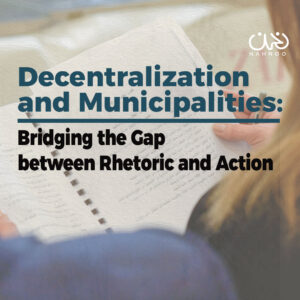The term “decentralization” pervades Lebanese politics, echoing through speeches, slogans, and the work programs of various parties. Despite its omnipresence, its true and immediate significance, particularly in the context of municipal work, is often overlooked.
The past decade has ushered in tumultuous times for Lebanon, thrusting municipalities into the forefront with a weighty burden. Unfortunately, these bodies find themselves ill-equipped and unprepared to navigate the complexities of the myriad challenges that have unfolded. These challenges include the enduring Syrian displacement since 2011, the exacerbation of the solid waste crisis in 2015, the onset of the financial and economic crisis in 2019, the emergence of the Covid-19 pandemic in 2020, and the natural disasters and earthquakes that have shaken the region in 2023. Moreover, municipal budgets have suffered a sharp decline due to the collapse of the local currency.
In light of this reality, and as part of an exhaustive study, “Nahnoo” Association undertook a comprehensive tour of municipalities, mayors, and municipal unions. During this initiative, interviews were conducted, focusing on topics related to their operational aspects, with a particular emphasis on administrative decentralization. It is noteworthy that the municipality stands as the smallest administrative unit in Lebanon and serves as the primary manifestation of administrative decentralization within the country. Our examination extended to the Independent Municipal Fund, spanning the period between 1993 and 2020. This involved a meticulous analysis of the mechanisms and criteria governing the distribution of funds to municipalities and regions.
The challenges facing municipal work are numerous. Frequently, attempts at modernization inadvertently weaken the system, primarily due to the absence of long-term planning and reliance on improvised methods in the formation of municipalities and their federations. Bureaucratic hurdles further hamper the financial capacities of municipalities, hindering the timely and accurate receipt of funds from the Independent Municipal Fund. Transparency issues persist, with municipalities often reflecting a lack of openness, auditing, monitoring, and accountability—mirroring challenges seen in other state institutions. Representation and participation validity also pose significant concerns at the municipal level.
In light of our extensive preparation, involving the creation of maps, graphs, data analysis, and gap identification, we have formulated a set of recommendations. These recommendations have been transformed into a legislative proposal, undergoing multiple rounds of discussions and observations. Subsequent amendments will be made to refine the proposal before presenting it to representatives with the aim of transforming it into law.
As an illustrative example, this proposed law aims to liberate the Independent Municipal Fund from the control of the central authority. In exchange, it advocates subjecting municipal operations to scrutiny by the Audit Bureau, the Civil Service Board, and the Central Inspection. Additionally, the proposal calls for the mandatory nature of municipal unions following a restructured framework that enhances their organizational structures. Addressing electoral processes, our proposal suggests the direct election of mayors and deputy mayors, with resident involvement in the nomination and election processes based on place of residence rather than mere registration. Further, we recommend the modernization of the Ministry of Local Administrations, with the attachment of the General Directorate of Local Administrations and Councils to it. A pivotal aspect of our proposal involves the adoption of a centralized electronic platform for the publication of crucial information related to local administrations. Notably, our proposal emphasizes the establishment of participatory democracy. This entails engaging residents in decision-making processes, allowing them to voice their opinions and aspirations. It advocates for the implementation of referendums and public sessions.
At present, we are actively conducting a series of meetings across diverse Lebanese regions to introduce and deliberate on the proposed law. The objective is to finalize its version, harboring the optimistic expectation that it will garner support among the nation’s representatives and eventually transition into implementation through the advocacy campaign recently initiated by “Nahnoo”.
This presents a unique opportunity for those enthusiastic about decentralization to transcend mere rhetoric and political debates, steering it towards tangible action that directly benefits citizens. Municipalities, as the most proximate administrative units, serve as a vital link between citizens and higher governing bodies—they essentially embody the state in the immediate vicinity of the people.

